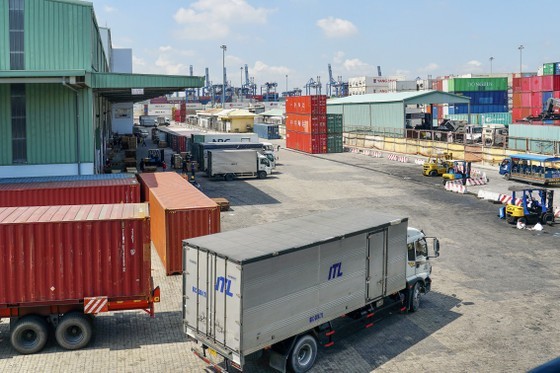 |
Imported and exported goods at a storehouse in Cat Lai Port (Ho Chi Minh City). (Photo: SGGP) |
Statistics reveal that investments in AI-solution companies in Vietnam as well as many ASEAN countries are still inadequate while nations like Singapore, China, and the US have poured much more money on AI implementation. This has forced Vietnam to allocate more capital to digital platforms in both product manufacturing and distribution for further economic growth.
The first step is for enterprises to realize the benefits of digital transformation such as increasing efficiency, building trust among trading partners, developing optimal supply routes, better administering transportation means, and making wiser decisions via cognitive computing using AI.
Specifically, the national GDP of Vietnam could increase by over US$100 billion in 2030 when the logistics industry completes its digital transformation to optimize its communications with clients, supply chain management, and cost control.
Along with the efforts of the business community should be the development of macro policies.
Firstly, the country's common logistics standard policy should be formulated in line with the standard trend and digital transformation rules of industrialized nations in order to ensure a perfect connection as to logistics software and hardware as well as traffic systems to create synergy.
Secondly, the human resources of the industry should be trained as to digital technology skills via a shared commitment of the business community.
Lastly, all socio-economic resources (capital cluster) should be closely connected since the logistics industry is the basement of all economic activities like tourism, trading, and investment, not merely supply chain ones. Due to its critical role, the industry needs the most resources.
When successfully applying digital technology, logistics will become the most important among national resources. It can be transformed from a link for the other four (natural resources, human resources, financial resources, and social resource).
As to social resource, traffic facilities like sea ports, port supporting services, air and ground routes, the railways, and the domestic water routes should be developed to link industrial parks, commercial zones, and urban areas nationwide. In addition, the development of e-customs, logistics associations, educational institutes to do intensive research in the field should be carried out in a specific area.
Regarding financial resource, it is necessary to concentrate capital on businesses with sensible strategy for digital technology application. This can be done via public investment policies, monetary policies, and public-private partnership in logistics.
The chosen human resources should be fluent in both professional knowledge and skills.
The natural resource in the logistics industry, when being modernized via digital transformation, can create breakthroughs for socio-economic growths as well as environment protection.
All done, the national logistics industry is truly the foundation to position the national economic scale in the global stage.
International collaboration to develop logistics centers, especially in key economic zones such as the Mekong Delta, Red River Delta, and the Central region, must also be focused on. It is necessary to consider economic integration in ASEAN, with a clear focus on forming a nation strategy for supply chains to ensure the important role of Vietnam in the region.
Exclusively, the project to construct Kra Canal in Thailand will obviously change the landscape of the maritime industry of not only ASEAN but also the world. This canal will bring great economic benefits to Vietnam.
Finally, cyber security must be taken care of to eliminate potential risks in the digital transformation process. This can be done via more cooperation and skill boosting.
The use of digital technologies among logistics enterprises is a scientific breakthrough. It requires pioneering research as well as suitable models for the natural, socio-economic features of each area, along with step-by-step implementation, to achieve success.
























